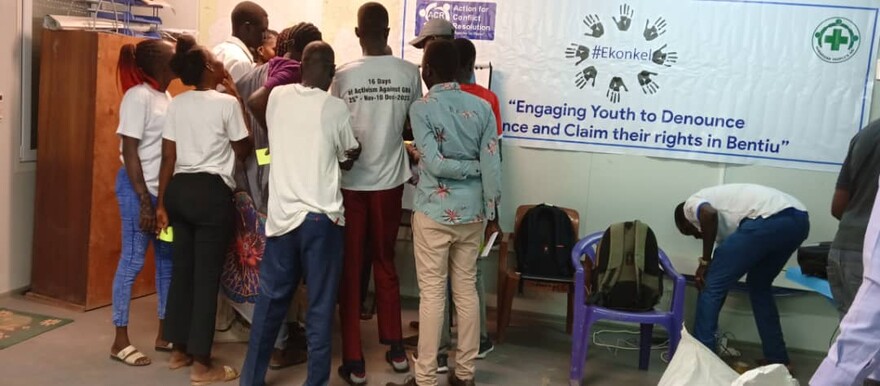The participants at a two-day youth training last week in Bentiu to denounce violence recommended several action points to change the culture of violent confrontations and embrace a culture of peace when resolving disputes.
The training held under the theme, “engaging youth to denounce violence and claim their rights in Bentiu,” recommended five new approaches, including ending gender-based violence, establishing and opening the Bentiu University to reduce illiteracy, advocacy for flood mitigations and engaging in alternative means to reduce malnutrition by creating jobs and other means of livelihood.
The priorities according to the participants can be achieved through youth collaborations under the theme “power of numbers.”
Mary Nyajaka, one of the participants, said they learned a lot of skills by reflecting on the nature of the ideal community and the current situation of Unity State through peacebuilding.
“We looked at ourselves now and where we want to be in the future. Peacebuilding is the use of dialogue and negotiations. The characteristics of a successful campaign are by not using violence but a peaceful means of communication by using persuasion, being humble, and using the language that is pleasing others,” she said. “The power in numbers is when we are many, we can do better, and when you are alone it is difficult. We need unity and know there is power in you. Do not be dormant, believe in yourself. Do your part and I do my part! Do not blame anyone, do not say the government is not doing anything for us.”
According to another participant, Tito Dak Kong who represented the Internally Displaced Persons (IDP) youth Forum, the training was basically on human rights, peacebuilding, and equality for all groups of actors in Unity State. He said that he learned how to avoid many bad practices to see a better Unity State.
“We learned that there should be no beating of children, avoid the culture of forced marriage, avoid domestic violence, and take up our roles as youth in building our community,” he said. “It was a very important training because it encouraged the people in the positions of authorities, especially the local chiefs, to follow the rule of law and the state government to take development as a serious matter.”
For his part, Rem Benson Kur said the training introduced to them the technical knowledge to attract development to their communities in Unity State.
“We want a Bentiu with lots of services for the people to be happy and for them to know that peace is prevailing. We asked for Bentiu University, good infrastructure, clean drinking water in Bentiu, better economic policies to be introduced, and for police and other organized forces to be financially empowered to curb criminality which is hindering peace processes in Bentiu,” he explained. “Bentiu needs a referral hospital so that people are not transferred to Juba and to reduce the high rate of unnecessary deaths. We want Bentiu with youth who are self-reliant by creating income-generating activities and electricity to control criminality.”
Meanwhile, Nyataba Gatluak, said persuasion was the best approach to peacebuilding that she has learned in solving problems and called upon Unity State youth to join hands to create the change they want.
“Let us join hands, work together, and let the plan be that we change this place to the Unity State we want,” she stated. “What I learned the other day in the previous training may not be the same as what I learn today, so it is a learning process.”
The facilitator of the training, Michael Gorjin Kuol, a youth rights project coordinator for Norwegian People’s Aid (NPA), said the training focused on synergizing none violence actions to help youth learn new tools and new ideas to denounce violence and use the techniques to claim their rights on social and political rights within their communities.
“Ending of gender-based violence (GBV) under the slogan of GBV Act, to influence stakeholders, the government, community and local chiefs and other stakeholders and the state assembly to enact anti-GBV laws,” he said.
Another Facilitator, George Mabany, the executive director of a national NGO Action for Conflict Resolutions (ACR), it is the responsibility of the youth in Unity State to work together to end the culture of violence.
“If there is violence, there will be no development. Let us cooperate so that Unity State reflects its name and the oil,” he urged. “The oil exploration in this state is uniting the whole of South Sudan. If we are not peaceful, people from other places will not come. Let us work together to see a new Bentiu.”




